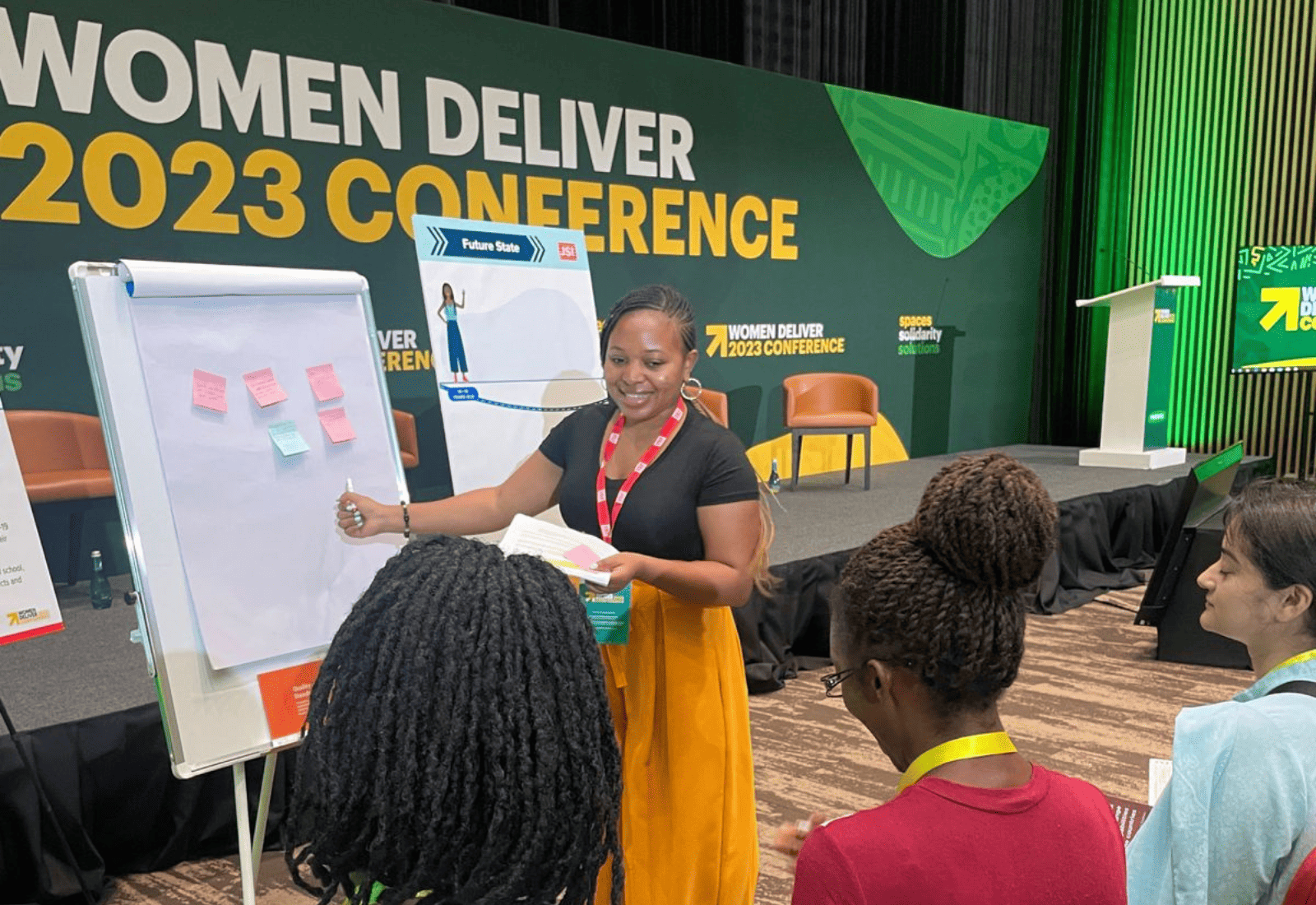
Gender Equity and the Sustainable Development Goals

Introduction
Gender equity is not possible if women and girls can’t access high-quality health services and education. They must also be involved in decision-making and have access to economic opportunities. That is why JSI is committed to ensuring that all people have access to health services, education, and economic opportunities regardless of gender, circumstances, or where they live.
Women Deliver 2023 Conference
From July 17 to 20, JSI experts joined over 6,000 policymakers, leaders, and gender advocates in Kigali, Rwanda, and more than 200,000 virtual participants at the Women Deliver 2023 conference to find evidence-based solutions to gender inequality and inequity.
JSI’s Participation
In line with the conference theme, Spaces, Solidarity and Solutions, JSI staff participated in a panel discussion on the power of equity in global development, and hosted two side events featuring youth leaders, education specialists, and public health experts. They also partook of various learning events on barriers to achieving gender equality, including women’s limited access to education; restricted access to health (including sexual and reproductive) services; lack of economic autonomy; and disproportionate exposure to climate crises.
Midpoint of the UN Sustainable Development Goals
This year, 2023, is the midpoint of the implementation of the UN Sustainable Development Goals 2030 agenda. It is a time to pause and examine the behaviors and societal norms that have long hindered gender equality and women’s empowerment and how they must change if we are to live in a gender-equal world in just seven years.
Action Points for Sustainable Results
What are some ways to gain sustainable results? We asked JSI experts and partners who attended WD 2023 to reflect on key messages and action points that they plan to advance in the various initiatives and projects they lead.
SDGs, Targets, and Indicators
-
SDG 3: Good Health and Well-being
- Target 3.7: By 2030, ensure universal access to sexual and reproductive health-care services, including for family planning, information and education, and the integration of reproductive health into national strategies and programs.
- Indicator: Access to sexual and reproductive health services.
-
SDG 4: Quality Education
- Target 4.1: By 2030, ensure that all girls and boys complete free, equitable, and quality primary and secondary education leading to relevant and effective learning outcomes.
- Indicator: Access to education for women and girls.
-
SDG 5: Gender Equality
- Target 5.1: End all forms of discrimination against all women and girls everywhere.
- Indicator: Gender equality in decision-making processes.
- Target 5.4: Recognize and value unpaid care and domestic work through the provision of public services, infrastructure, and social protection policies and the promotion of shared responsibility within the household and the family as nationally appropriate.
- Indicator: Economic opportunities for women.
Analysis
The article highlights the importance of gender equity in accessing high-quality health services and education, as well as being involved in decision-making and having access to economic opportunities. Based on this, the following SDGs, targets, and indicators can be identified:
1. SDG 3: Good Health and Well-being
The article emphasizes the need for women and girls to have access to high-quality health services, including sexual and reproductive health-care services. This aligns with Target 3.7, which aims to ensure universal access to sexual and reproductive health-care services. The indicator mentioned in the article is “access to sexual and reproductive health services.”
2. SDG 4: Quality Education
The article mentions the limited access to education for women and girls as a barrier to achieving gender equality. This relates to Target 4.1, which aims to ensure that all girls and boys complete free, equitable, and quality primary and secondary education. The indicator implied in the article is “access to education for women and girls.”
3. SDG 5: Gender Equality
The article discusses various barriers to achieving gender equality, including women’s limited access to education, restricted access to health services, lack of economic autonomy, and disproportionate exposure to climate crises. These align with multiple targets under SDG 5:
- Target 5.1 aims to end all forms of discrimination against women and girls everywhere.
- Target 5.4 aims to recognize and value unpaid care and domestic work through the provision of public services, infrastructure, and social protection policies, promoting shared responsibility within the household and the family.
The indicators mentioned in the article are “gender equality in decision-making processes” and “economic opportunities for women.”
Table: SDGs, Targets, and Indicators
| SDGs | Targets | Indicators |
|---|---|---|
| SDG 3: Good Health and Well-being | Target 3.7: By 2030, ensure universal access to sexual and reproductive health-care services, including for family planning, information and education, and the integration of reproductive health into national strategies and programs. | Access to sexual and reproductive health services. |
| SDG 4: Quality Education | Target 4.1: By 2030, ensure that all girls and boys complete free, equitable, and quality primary and secondary education leading to relevant and effective learning outcomes. | Access to education for women and girls. |
| SDG 5: Gender Equality | Target 5.1: End all forms of discrimination against all women and girls everywhere. | Gender equality in decision-making processes. |
| SDG 5: Gender Equality | Target 5.4: Recognize and value unpaid care and domestic work through the provision of public services, infrastructure, and social protection policies and the promotion of shared responsibility within the household and the family as nationally appropriate. | Economic opportunities for women. |
Behold! This splendid article springs forth from the wellspring of knowledge, shaped by a wondrous proprietary AI technology that delved into a vast ocean of data, illuminating the path towards the Sustainable Development Goals. Remember that all rights are reserved by SDG Investors LLC, empowering us to champion progress together.
Source: jsi.com

Join us, as fellow seekers of change, on a transformative journey at https://sdgtalks.ai/welcome, where you can become a member and actively contribute to shaping a brighter future.






